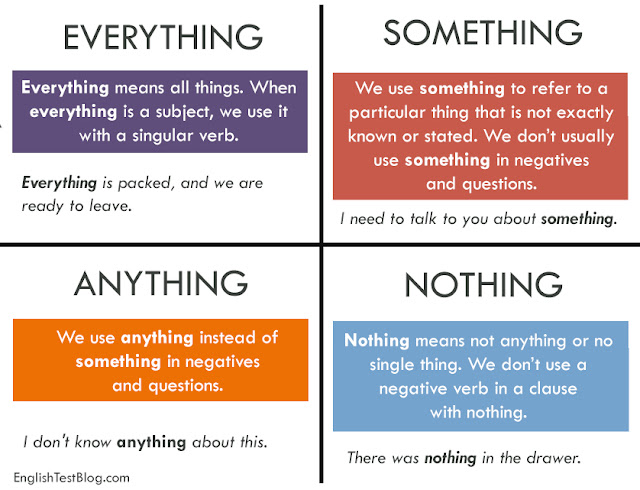The words everything, something, anything, and nothing are indefinite pronouns. We use these words to refer to things.
We use singular verbs after all these words.
- Everything is ready for the party.
- Something smells like rotten meat.
- There is nothing wrong with the engine.
- Is anything the matter?
We can use everything, something, anything, and nothing as the subject or as the object of a sentence.
- He pushed the button but nothing happened.
- I know nothing about football.
- She did everything to save their marriage.
- Everything is processed by computer.
Everything
Everything means all things. When everything is a subject, we use it with a singular verb.- Everything is packed, and we are ready to leave.
We can use everything to refer to a particular situation or life in general.
- Is everything all right?
- Did everything go smoothly?
- Everything is fine.
Everything can mean the most important thing in your life.
- He says money isn’t everything.
- My family is everything to me.
- Your friendship means everything to me.
Something
We use something to refer to a particular thing that is not exactly known or stated. We don’t usually use something in negatives and questions- I need to talk to you about something.
- There’s something in my shoe.
- Give me something to do. I’m bored.
We can use something to show that the description or amount that we are giving is not exact.
- This drink tastes something like lemon.
- She weighs something between 50 and 60 kilograms.
- He earns something around $50,000 a year.
Anything
We use anything instead of something in negatives and questions.- I don't know anything about this.
- Did you notice anything strange?
- Is there anything in the bag?
- She hardly ate anything.
We can use anything to refer to a thing when it does not matter which.
- They'll eat almost anything.
- Now you can do anything you want.
Nothing
Nothing means not anything or no single thing. We don’t use a negative verb in a clause with nothing.- There was nothing in the drawer.
- I turned the key but nothing happened.
- Nothing would make him change his mind.
We can use nothing on its own in short answers.
- A: What’s that in your hand? B: Nothing!
We can use nothing with but to mean only.
- He’s nothing but a thief.
- He'll need nothing but a miracle to pass this test.

Comments
Post a Comment